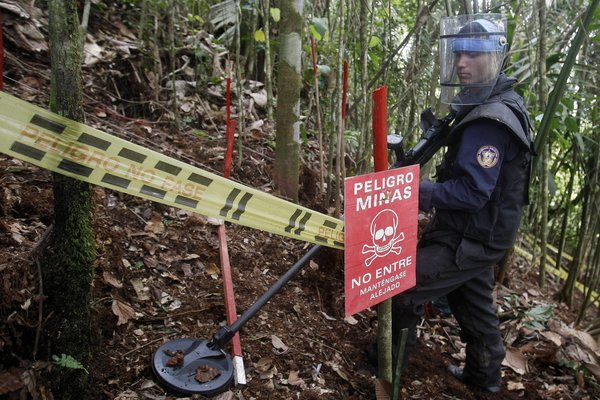With the FARC markedly weakened, its leaders have been negotiating with the government of President Juan Manuel Santos since the fall of 2012 to end the conflict. That ambitious and complex effort appears to be reaching a make-or-break phase.
The delegations, which are negotiating in Havana, are wrestling with the terms of disarmament for the rebels as well as with questions of punishment for atrocities committed by both the Marxist-inspired group and government-backed forces. If a deal were to be signed by fall, it would be presented to voters in a referendum. Only then could the Colombian government start carrying out the agreements that they have reached, which include land reforms that would boost the agricultural sector and expand opportunities for farmers. The teams have also reached tentative agreements on counternarcotics policy and apolitical role for the insurgent group. Over the weekend, negotiators announced that they would start collaborating on an effort to clear land mines.
After five decades of war, the prospect of a negotiated deal, not surprisingly, has many critics, particularly among those whose family members have been killed or maimed in the conflict. Some worry that guerrilla leaders who have committed atrocities could escape punishment. Others warn that even if the FARC were to nominally disband, its factions would continue to carry on kidnapping and trafficking cocaine.
Still, an agreement is the best alternative to ending the fighting, which has ebbed as the talks have progressed, and giving Colombians in war-torn districts hope for a brighter future. The Obama administration recently signaled its strong support for the process by naming Bernard Aronson, a former senior diplomat with expertise in the region, as an envoy to the peace process. Mr. Aronson, who is not expected to participate directly in the talks, recently traveled to Bogotá to meet with Mr. Santos, who deserves credit for pursuing a peace process that nearly cost him re-election. Mr. Aronson also visited Havana to meet with the chief negotiators of both teams.
The backing of the United States is undoubtedly helpful. Since the American government has the top leaders of the FARC under indictment for drug trafficking, it should be involved in discussions about the future of drug interdiction policy and could play a role in a postconflict era. But getting to a deal depends mainly on the willingness of Colombians to make tough compromises.
The type of transitional justice framework viable in this case is unlikely to satisfy all victims, and it certainly will not encompass every abuse committed during a war that had an estimated seven million victims. But skeptics should realize that the talks are already bearing fruit. The number of reported acts of violence linked to the armed conflict dropped to 1,186 last year from 2,003 in 2013, according to the Peace and Reconciliation Foundation, a nongovernment group that used official and independent data to produce an assessment of the state of the conflict.
If the peace process were to stall or collapse before the end of the year, the conflict would again intensify and the Colombian government would have no option but to pursue a strategy of defeating the FARC militarily. That goal, which has been elusive for years, would result in a fresh wave of bloodshed, recriminations and suffering. For Colombians, such an outcome would be wretched, even more so because it is avoidable.
